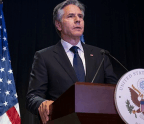What They Took With Them As They Fled Conflicts

As people escape from turmoil around the world, they often can carry only a few things with them.
Settled in their new countries, as years and sometimes decades go by, they often find these objects precious reminders of the lives left behind. They're cherished long after the crisis has passed. In some cases, these keepsakes remind refugees and migrants of an essential part of who they are.
NPR's story about how a toy monkey ended up becoming a connection to a previously unknown part of a German boy's family inspired us to look for other similar stories.
Below are a few such stories shared by NPR listeners and readers. Though in their own words, the text has been edited for clarity.
A red backpack filled with precious rice
Loan Pham was born in a small village in southern Vietnam in 1984, nine years after the end of the Vietnam War. Her immediate family supported the South Vietnamese regime. When the communist North Vietnamese prevailed, they were ostracized, she says, even by members of her extended family. They wound up homeless.
We just took shelter at the schoolyard in the village. Villagers who would feel sorry for us, not our relatives, they would donate empty rice bags, so we could tie them up as a small canopy for a family of four to shelter ourselves from the rain and the monsoons.
Pham often went hungry.
I'm kind of ashamed to admit this, but I became a professional thief. A food thief. I really couldn't tolerate hunger. I kept on going to this village market and stealing bananas. I really couldn't tolerate the pain from hunger. My mom was very ashamed and she beat me up quite often for this heinous act.
One time, Pham said, a local food vendor caught her stealing bananas.
She was obviously unhappy. So she threatened to burn me up. She tied me to a pole. She put hay all around me. She lit the hay on fire. I had no idea what was going on and thought there's no way this woman is going to burn me for a banana. And the woman started freaking out because the fire got closer and closer to me. I was right in the middle. And then a man walked by, saw what was going on. He ran to me and got me. And that's what saved me that one day.
The brutality of war and then postwar starvation really forced people to lose their humanity, competing against each other for food, basic, basic necessities.
Pham and her family were granted asylum in 1991 to come to the United States.
You’re reading a preview, subscribe to read more.
Start your free 30 days





